Ovum research highlights IoT growth
The Internet of Things, or IoT, is and has been making major waves in both consumer and industrial applications, and the IoT is only expected to grow as new connections ranging from health wearables to asset tracking sensors are deployed.
To get a handle on how the IoT has taken shape, research firm Ovum tracked investment from telecom and tech firms in IoT startups between 2011 and 2015.
The findings reveal total investment and acquisitions of around $31 billion.
“Ovum tracked 76 deals across 8 sectors, including IT services, wearables and connected car,” Digital Service Senior Analyst Francesco Radicati said. “Intel led the charge with its US $16.7 billion acquisition of chipset maker Altera, while Verizon, Google and Qualcomm each made at least one acquisition over US $1 billion during the reporting period.”
According to Ovum, there were four such deals in 2011 and, by 2015, 19 IoT-related investments. The peak came in 2013.
The biggest single investment in 2015 was a $115 million round of funding for dedicated IoT network provider Sigfox, which is deploying in Europe, the Middle East and the United States.
In that last Sigfox funding round, investment came from NTT DoCoMo, SK Telecom and Telefonica.
“These new investors give Sigfox a worldwide footprint,” wrote Sigfox spokeswoman Amélie Ravier in an e-mail. “Moreover, other telcos will be welcome to join as capital participants in the future with the objective of standardizing the Sigfox technology during the company’s worldwide rollout.”
Intel’s acquisition of Altera was part of a wave of consolidation in the silicon space last year.
Intel CEO Brian Krzanich said the acquisition will position Intel to be an industry leader in the data center and IoT segments.
“Intel’s growth strategy is to expand our core assets into profitable, complementary market segments,” Krzanich said. “With this acquisition, we will harness the power of Moore’s Law to make the next generation of solutions not just better, but able to do more. Whether to enable new growth in the network, large cloud data centers or IoT segments, our customers expect better performance at lower costs. … This is the promise of Moore’s Law and it’s the innovation enabled by Intel and Altera joining forces. We look forward to working with the talented team at Altera to deliver this value to our customers and stockholders.”
“While telcos are growing more interested in IoT, the data show that vendors like Intel and Qualcomm, and tech giants like Google, are still putting the most money into the sector,” Radicati, the author of the report, said. “Thanks to their corporate venture funds and their proximity to key innovation ecosystems, these firms have the expertise to identify up-and-coming IoT startups, as well as the funds needed to invest and acquire such companies.
“However, telcos are becoming more active themselves, by setting up their own venture funds and startup accelerators and by making acquisitions to support their existing strategies. Notable examples are Verizon’s 2012 purchase of Hughes Telematics and Vodafone’s 2015 acquisition of connected car service provider Cobra.”

